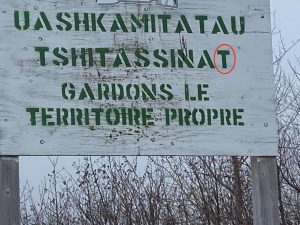The Innu spelling of the place name (toponym) Matimekush reflects the common usage where people hear an i. However, the word is derived from the name of a fish: matamekᵘ as indicated by its etymology in the dictionary: matamekuss. It could therefore also be written Matamekush. The dictionary spelling reflects current habits, which are well established, rather than the historical form (from ancient Innu). In French and English, it’s written: Matimekosh.
[answer compiled by the Comité Tshakapesh-Innu Dictionary editorial team, 2022]
And are there other words like this?
Mitash is a dependent noun because it is formed with the prefix mi- and the stem -tash, which cannot exist on its own: mi+tash = mitash ‘sock’. It’s a dependent noun because we can’t say *nimitash (*ni+mitash), but instead say: nitash (ni+tash) ‘my sock’. Most dependent nouns are kinship terms or body parts, but there are also some objects like mitash ‘sock’ or miush ‘box’ (niush ‘my box’, tshiush ‘your box’). Furthermore, the animacy of mitash varies: in some communities the noun is animate, while in others, it’s inanimate.
Dependent nouns indicate that certain things are always seen in relation to a whole (body, person, kinship) in Innu.
See Dependent nouns.
[answer compiled by the Comité Tshakapesh-Innu Dictionary editorial team, 2022]
The distinction between the stems nekatsh- [nekâtsh-] meaning ‘misery’ and nikatsh [nîkâtsh-] meaning ‘slowness’ exists only for speakers of the MAMIT dialect. For speakers from Pessamit and Uashat (Western dialects), nikatsh- does not exist and its meaning is added to that of the stem nekatsh-.
In the dictionary, for MAMIT, there are verbs with nikatsh- (meaning ‘slowness’) and verbs with nekatsh- (meaning ‘misery’). For Western dialects, there is only the form nekatsh- but the definitions include both meanings, ‘slowness’ and ‘misery’.
The differences in the definitions of these verbs therefore correspond to two large dialectal areas: MAMIT and WESTERN.
[answer compiled by the Comité Tshakapesh-Innu Dictionary editorial team, 2022]
Historically, there was a short i (see East Cree ihtaau and ihtakun). The i reappears in some forms like nititan, tshititan or in the changed form (i>e) of the conjunct etat.
[answer compiled by the Comité Tshakapesh-Innu Dictionary editorial team, 2022]


[answer compiled by the Comité Tshakapesh-Innu Dictionary editorial team, 2022]

